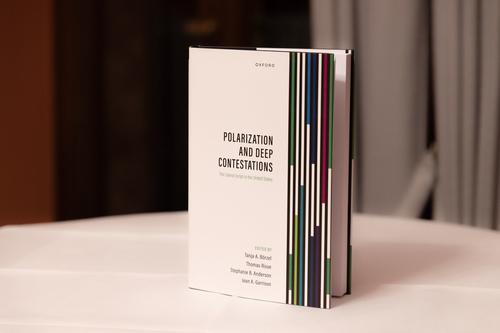Polarization and Deep Contestations | SCRIPTS researchers discuss results of US Election during book launch
Panellists of the book launch at the German Council on Foreign Relations (DGAP). From left to the right: Thomas Risse, Ralf Fücks, Rachel Tausendfreund, Chris Spear and Tanja A. Börzel.
Deep Contestations (Second Volume, SCRIPTS Oxford University Press Series)
News from Nov 12, 2024
The deep contestations against the liberal script in North America – made even clearer by the recent victory of Donal Trump in the last USA presidential election – were the topic of a discussion panel during the launch of the SCRIPTS book “Polarisation and Deep Contestations: The Liberal Script in the United States” at the German Council on Foreign Relations (DGAP).
The book, which explores the ideological and affective polarization currently affecting American democracy, was published in early autumn and is part of a series developed from a cooperation between SCRIPTS and the Oxford University Press. You can read more about the book here.
Grievances influenced Trump re-election
During the event – which took place on 11 November, shortly after the election – the panellists Tanja A. Börzel, Ralf Fücks, Chris Spear, Rachel Tausendfreund, and Thomas Risse delved into the key drivers of political polarization. SCRIPTS speaker Tanja Börzel presented findings from the study highlighting three key grievances central to the Trump re-election: material inequalities, political inequalities, and the structure of the political system itself. They also compared the situation in the United States with developments in Germany and discussed how these contestations impact US foreign policy, US-German relations, and the broader landscape of democracy.
US Election my be indication of Europe’s future
„The US has been a defining avant-garde in what happens in Europe," said Ralf Fücks. Looking at the US might mean looking into our European future. He described a new phenomenon of an emerging convergence of authoritarian and libertarian arguments. Rachel Tausendfreund argued that the „economics of US democracy aren’t working for working people," addressing the fundamental challenges Trump poses to the political system. She also highlighted an opportunity to revise the foreign policy script established after 1945.
For up-to-date information about SCRIPTS events and further SCRIPTS / Oxford University Press publication, follow us on X (former Twitter) and LinkedIn.


